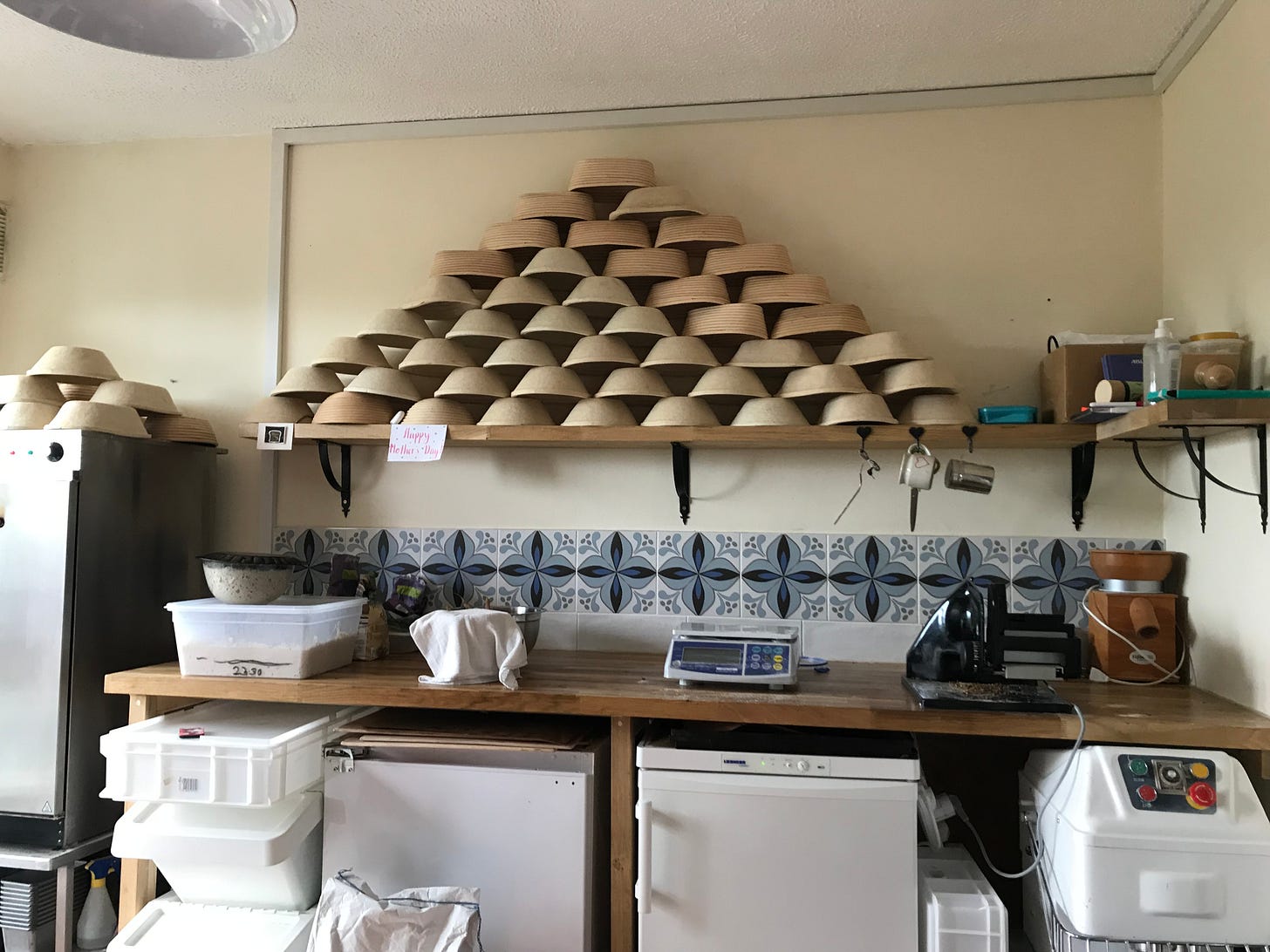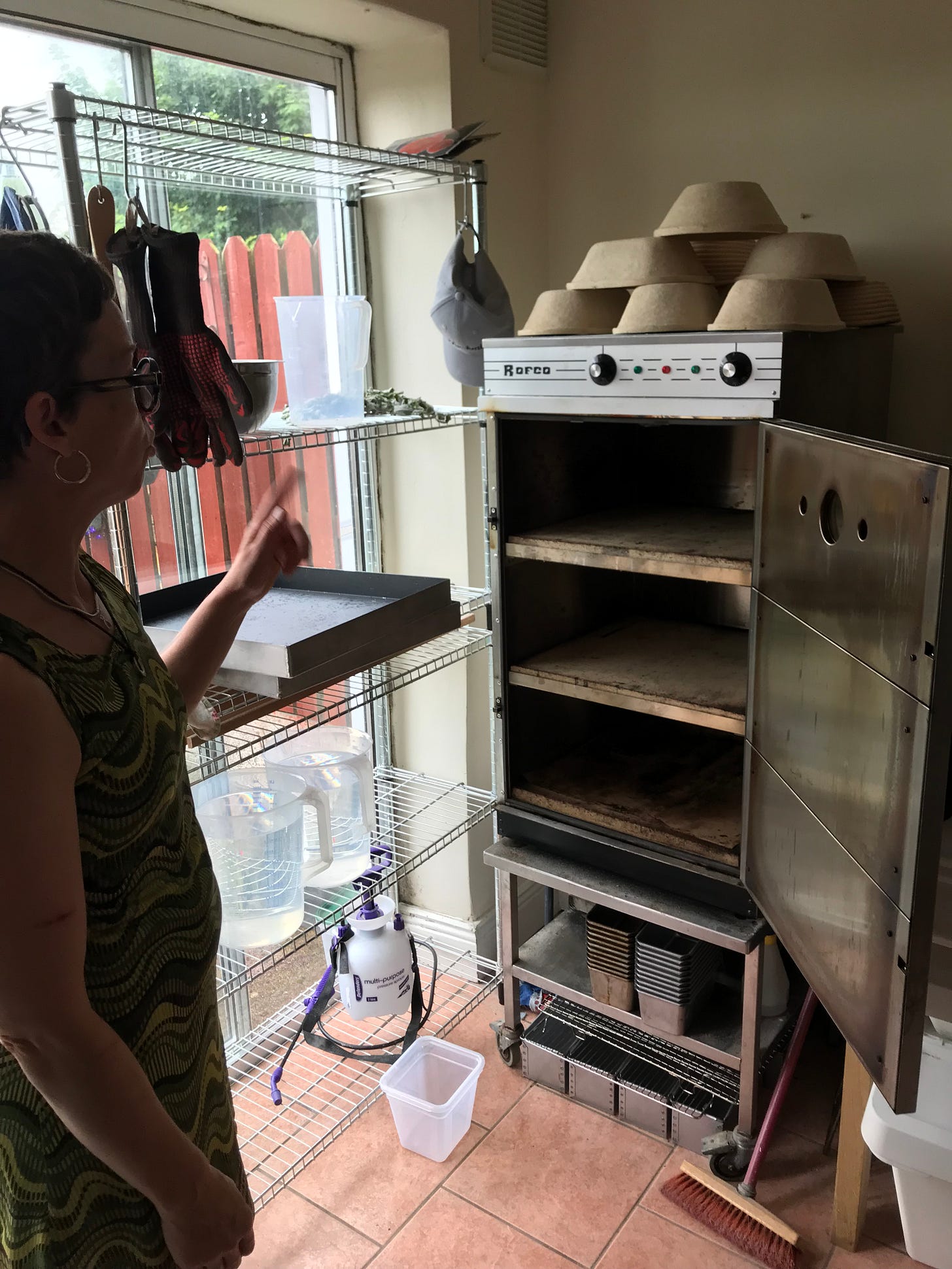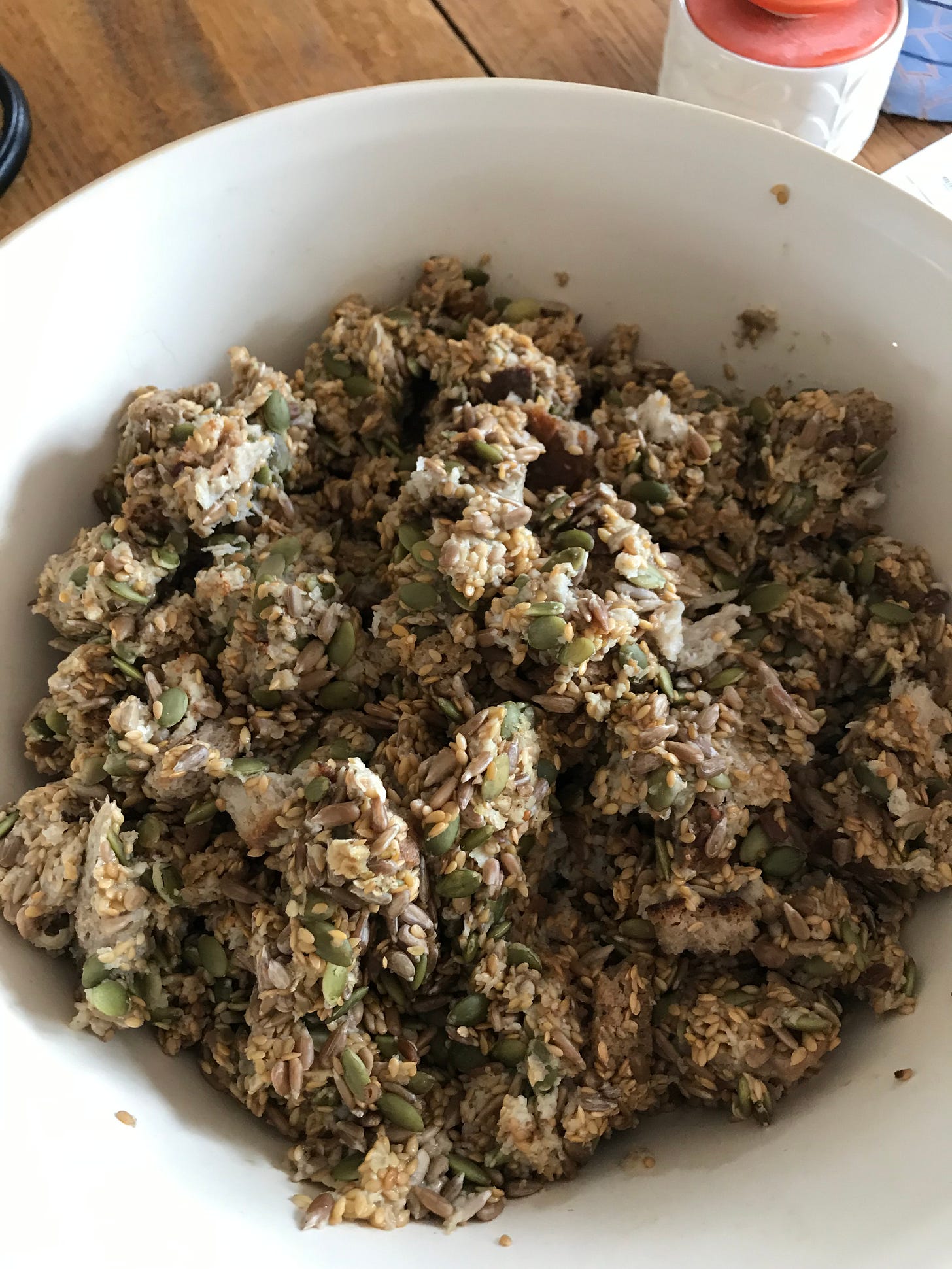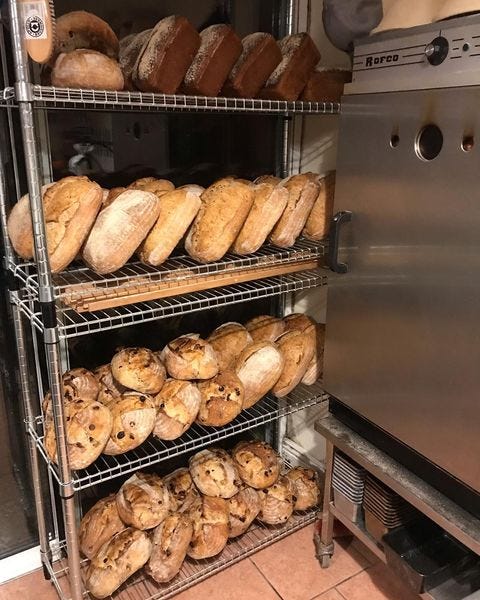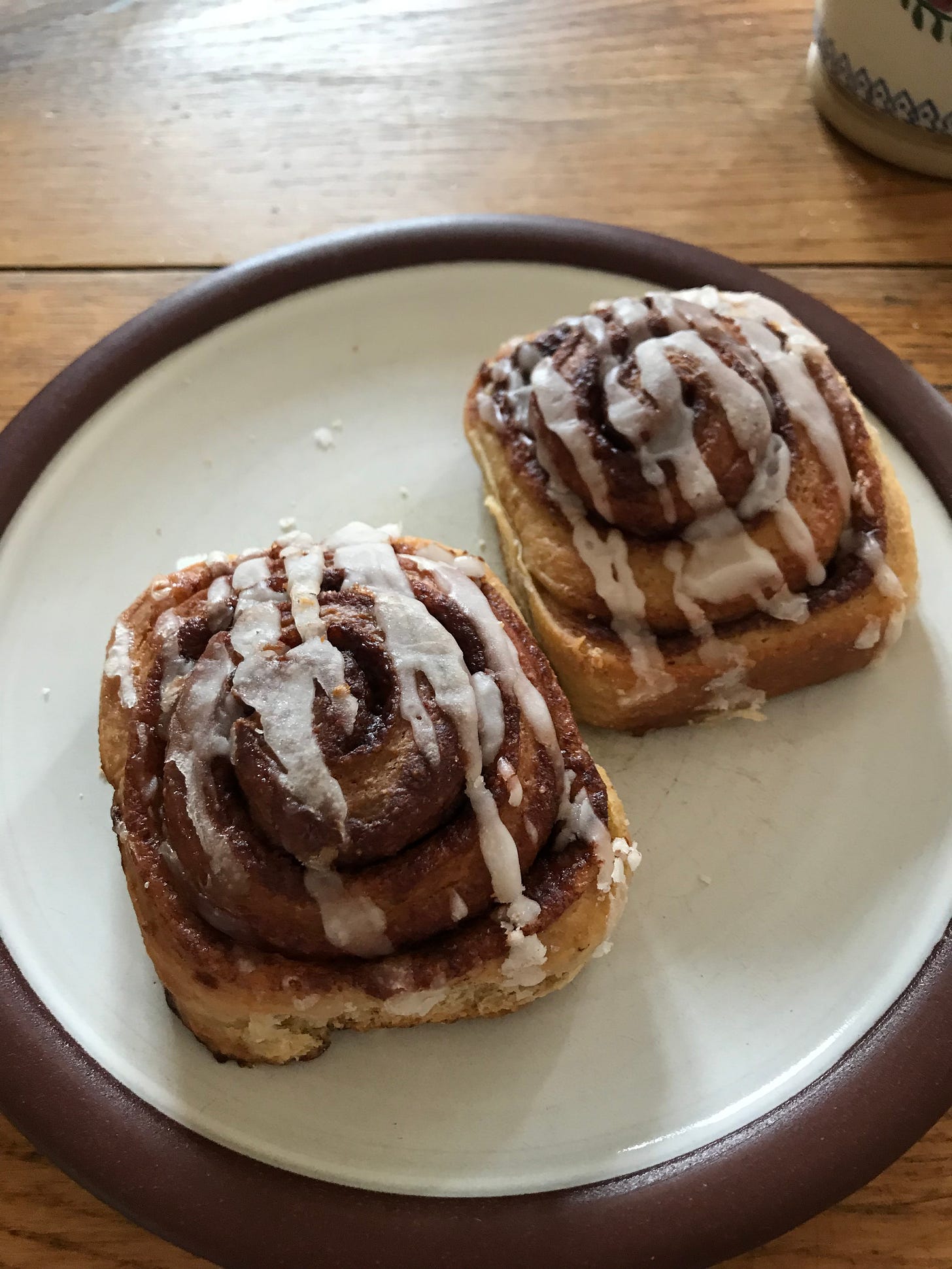Making bread and happiness in a microbakery in Mayfield
In the space of a year Angela Nöthlings has established Ryes & Shine, a microbakery and a business from the kitchen of her home in Mayfield.
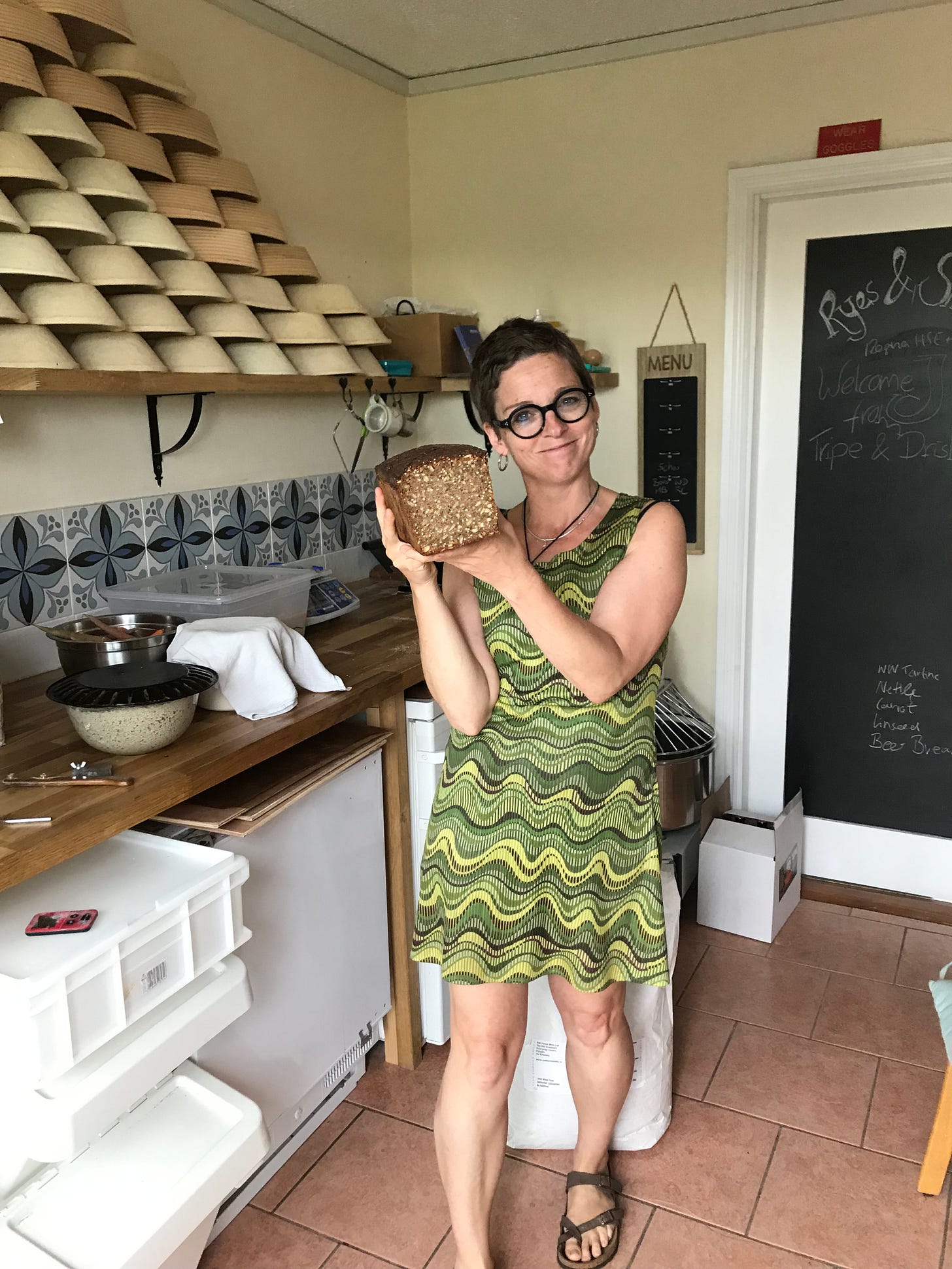
The small entrance porch to Angela Nöthlings house in Mayfield is a little different to most people’s. Her kitchen is also a little different - scratch that - it’s a lot different, but the porch and kitchen are connected.
By homemade sourdough bread.
At the entrance way there’s a neat little stand refashioned from some wooden boxes from Ikea; the middle panel is painted in black so that Angela can write on it. On the boxes there’s a few names: Joe, Rupert, Jane, Paschal. These are customers of Ryes & Shine, the microbakery that Angela started just over a year ago. In the boxes she puts the orders for bread on Wednesdays and Saturdays.
From her home that she shares with Mia and Luna, her teenage daughters, twice a week Angela turns out the wonderfully sounding Mayfield bloomer, Schwarzbrot (a whole grain bread from Germany), carrot rye, lemon slices and cinnamon buns. In the space of a year Angela’s gone form baking a half dozen loaves a week to upwards of nearly a hundred loaves a week. She sells the loaves at Brian Dillons GAA club every Saturday, and at various other locations around the northside of the city on Wednesdays. And customers also come by her house to pick up a freshly baked loaf. If Angela is home they’ll chat for a few minutes, she might tell them what she’s experimenting with, and her customers might give some feedback, and place an order for the following week.
To use a word that’s become debased, it’s all very authentic.
The day after our interview Angela will be at a new location: just outside Henchys Bar in St Luke’s. Long before Angela went down the microbakery rabbit hole, she had a dream that if she ever won the lotto she would set up shop in the little toll gate outside Henchys at St Luke’s cross, selling coffee and cinnamon buns from the hatch.
“Just that, no Coke, just buns and McCabe’s coffee,” Angela tells me in her kitchen, where I am eating and drinking that exact combination. Angela recommends a wee dollop of honey in the coffee.
While I eat Angela recounts her lotto fantasy in the way we all do with our lotto fantasies: something that we dream of, that makes us happy, but deep down we’re doubtful that would ever happen. But the fantasy is fulfilling in itself.
And yet, within a nearly a year, and 25 years on from landing in Cork from Geilenkirchen near Aachen in Germany where she grew up (close to the Dutch border), Angela finds herself meters from that iconic little structure selling her homemade sourdough bread to the people of Cork. The lotto didn’t get her this close, but flour, salt, water, yeast, a podcast and hard work did.
Blame Tommy
It started with a podcast, actually two. At the beginning of July last year, in those heavy nights of summer, Angela, an art therapist working with the HSE at Cork University Hospital was in bed winding down, listening to Tommy, Hector and Laurita from the podcast of the same name.
“Tommy was really negative that night,” Angela recalls. She had enough of him, and decided to try something else before nodding off. But she didn’t know what to listen to, so she said she’d try something she was interested in, baking, specifically sourdough breads.
Turns out there’s a podcast for that - The Sourdough Podcast.
“It was a revelation,” Angel recalls. “That night I learned about two things that were to set me up for what was to come.”
One was a Belgian oven, the other is essentially what she has established, a microbakery.
On the back of the podcast and a can-do attitude, Angela had what might be called an epiphany, or a notion: she was going to make sourdough bread at home and offer it to her colleagues in the CUH. Just. Like. That.
And she did.
But first, a quick primer on sourdough bread. What separates sourdough bread from the loaf of mass produced bread is the yeast. Angela and the small army of sourdough bakers spread out across the globe forego commercial yeast in favour of a ‘starter’, typically a combination of fermented flour and water mixture that contains a wild yeast and bacteria. That combination will get the bread to rise, the same way commercial yeast does. Much like an artist sizing up a canvas that has been primed, the basic dough has infinite possibilities: you can add seeds, nuts, dried fruits, cheeses, herbs, grains and so on and so forth.
Looking back, Angela knows she did it the right way, for her. Her business plan amounted to… just do it. She didn’t road test or future proof any of her ideas. Angela does not traffic in buzz words. She went to work, got six orders, and then came home and had to get to work.
Those orders begat more orders and before she knew it within a month she had somehow stumbled into a business, except she had none of the infrastructure of a business set up, such as spreadsheets, costings, targets, a roadmap.
So after the bread came the business.
Angela said the support she got from the Local Enterprise Office was amazing. “And it’s all free.”
Her background is in social work and art therapy, not in spreadsheets.
“But the mentor who worked with me was able to steer me through why I needed to increase the size and the price of my Schwarzbrot, and then in turn I was able to convey that to my customers,” Angela told me.
Connie
One of the biggest struggles for Angela and her new business was not drumming up customers, but rather with her oven.
That oven is three feet from where we are at the kitchen table, a small narrow Belling oven. It could bake a few loaves at a time, but every time she popped a loaf in the oven, it would trigger anxiety.
“I call it my shitty oven,” she says laughing. (She’s still grateful for the six months of hard work it stood her though). With baking, temperature is obviously important, but so too is moisture. Before they enter the pre-heated oven, the loaves that Angela make have been through fermentation and shaping and scouring - baking involves a lot of time standing, or sitting, around before the dough hits the oven and at which point there’s quite an amount of moisture in the mixture. Remember you can’t make a loaf with out water!
As she explains, the Belling oven had a fan, and that would blow air through the oven, and with it the temperature would waver. The slightest of temperature changes affects how the bread is cooked, from the crust right through to the moist centre.
“I always had an (oven) element on standby,” Angela says, pointing at the spare oven element hanging on a rack on the other side of the kitchen.
“And could you replace that yourself?” I ask.
“No, I had an electrician on standby as well,” Angela says laughing.
It all changed when she got a Rofco oven, shipped over from Belgium last December. We get up and walk over to her pride and joy. I ask how hot she can get, assigning a female pronoun to the oven.
“Her name is Connie,” Angela says. Rofco that is. Glen Hansard gave her that name.
“Say what?”
The actor and musician kicked in a considerable sum when Angela was crowdfunding to purchase the Rofco oven. All in all Rofco/Connie cost her €2,500, including shipping from Belgium. For his generosity Angela bequeathed naming rights to Hansard, and that’s how Connie came to be on the Northside.
Angela recalls when she first used Rofco last January to bake some of her Mayfield bloomers she was so nervous. There’s a little glass plate situated on the oven door between the vents and she remembers looking through it and seeing the bloomers rise.
“I was so happy,” she says. “Like, I was so happy.”
In a way, Connie showed Angela how far she had come and how hard she had worked. Cooking with the Belling was nerve wracking, and Angela was feeling her way in the dark. She’d started a business without really realising what that entailed. For example, a few months in, she knew that if she was going to continue she would need certification to show that what she was doing was kosher.
Luckily she was supported by a sprawling network that runs from the local to the global. She connected with likeminded people such as the baker behind Lily’s Loaf in London and closer to home Ian Whelan from Fadó Coffee truck in Douglas who was a few steps ahead in the process of setting up and registering his business. By joining Real Bread Ireland, she was able to tap into a huge network of bakers who were on the same journey as Angela.
There is a language to baking that is entirely new to me. In fact, on Tripe+Drisheen, Ellie is the baker. Together with her sister she ran a bakery for years, before leaving to take up a career in journalism. My own career in baking lasted one morning.
One summer a few years after my second son Fionn was born we stayed in Kyoto, where the summer time temperature feels like being inside an oven. I think I was going though a mid-life crisis as I asked my friend Jiro, the local baker, if I could work in his small bakery for a few days while I was on summer holidays. I wanted to learn to bake baguettes, bagels, karepan and lemonpan. Japanese bakeries rock.
Jiro looked at me like there was something wrong with me, but perhaps not wanting to offend me, let me in to the kitchen.
I know my way round kitchens - I was a kitchen porter during college in the Idaho Cafe, and somehow I was a prep chef in Paddy Garibaldis from day one.
But, I lasted a few minutes in Jiro’s bakery before he put me washing dishes. I know my place, and I was clearly in the way. But what I learned that morning is that a good loaf of bread is the culmination of thousands of hours in the kitchen making thousands of loaves of bread.
Angela says she is still learning so much. She can feel her body growing into becoming a better baker.
In her kitchen she shows me flour that has been scalded, when near boiling water has been poured over flour which is left to stand. Seeds run through it.
“Smell it,” she says holding the bowl up. It smells alive, which it is. From the fridge she takes some levain, an off-shoot of the sourdough starter with a limited lifespan.
Angela then pulls down some knives that she uses to scour the dough before its placed in the oven. They were kindly made for her by a local man who works in the off license nearby and heard she was making homemade bread.
“I could tell he was interested in what I was doing and I gave him some samples,” Angela says. Not long after he presented her with knives he had made specially for her.
That’s something else that her microbakery has brought her - closer to the community. When she’s out walking her dogs Stella and Lady, passersby will ask her what time she was up at, or if she’s got any new loaves on the go. She’s the bread woman now, the local baker to the many who know her, especially from Saturday mornings at Brian Dillons GAA club.
Often she’s accompanied by her partner Brendan O’Brien on Saturday mornings. Brendan was a huge source of support in getting Ryes & Shine up and going; he’s often the comedic foil while they’re out selling the bread and buns.
As Angela admits, she’s a serious person, and she’ll be busy explaining where the wheat comes from, what seeds she uses, how the process of fermentation works.
“Brendan will just come out and say, ‘This one will cure Covid,’” she says laughing.
“He’s the best sourdough seller on the Northside,” she adds.
Doughnations
Angela thinks a lot about bread; as she told me, when she does something she goes all in and wants to do it well. But she also thinks about her customers, who’s eating her bread, which bread they like, and also about those who would like to eat the bread she makes, but perhaps the price is beyond their means.
This summer she’s been experimenting with brining the price down through a donation (or “doughnation”) system. On orders of more than €20, Angela will put €2 of that to another loaf.
As Angela explains, “one doughnation equals €2 off for another person who might find it hard to justify spending €5 or €6 on a sourdough loaf.”
The tokens are available from her stall each sale day and customers can take one form the box when they are buying a loaf.
Angela told me she’s built up a bank of these tokens now - some customers will add an extra €2 to their orders so that it can go back into the “doughnations”.
She always has free samples on hand as well, and while she’s not the kind of person to push her wares on anyone, the bread she makes is wholesome and healthy. You will not find additives in any of her ingredients, and she’s also sourcing her flour from Irish mills such as Oak Forest Mills in Kilkenny and Dunany Flour in County Louth. She also relies on imported flour as well.
On a door in the kitchen near the floor is written a few recipe ideas that Angela will soon be trying out: sourdough made with nettles, carrot, linseed and beer bread, with the beer coming from the Cotton Ball Brewing Co. just up the road on the Old Youghal Road..
There’re endless possibilities in making sourdough bread, but Angela knows what she wants to do. She wants to keep it manageable, stick to ambient baking, and keep bringing health and happiness to her customers.
“I’ve never been happier,” Angela says. Maybe that’s the secret ingredient.
Angela bakes twice a week and every Saturday she sells from Brian Dillons GAA club and she’ll back be back outside Henchys Bar on July 27. You can follow her on Instragram or Angela can be contacted directly on 086-3565036 for orders.




